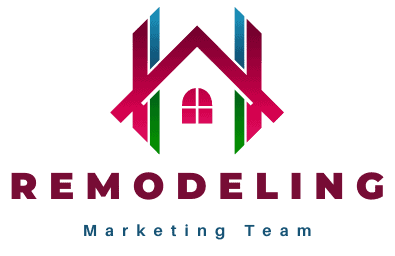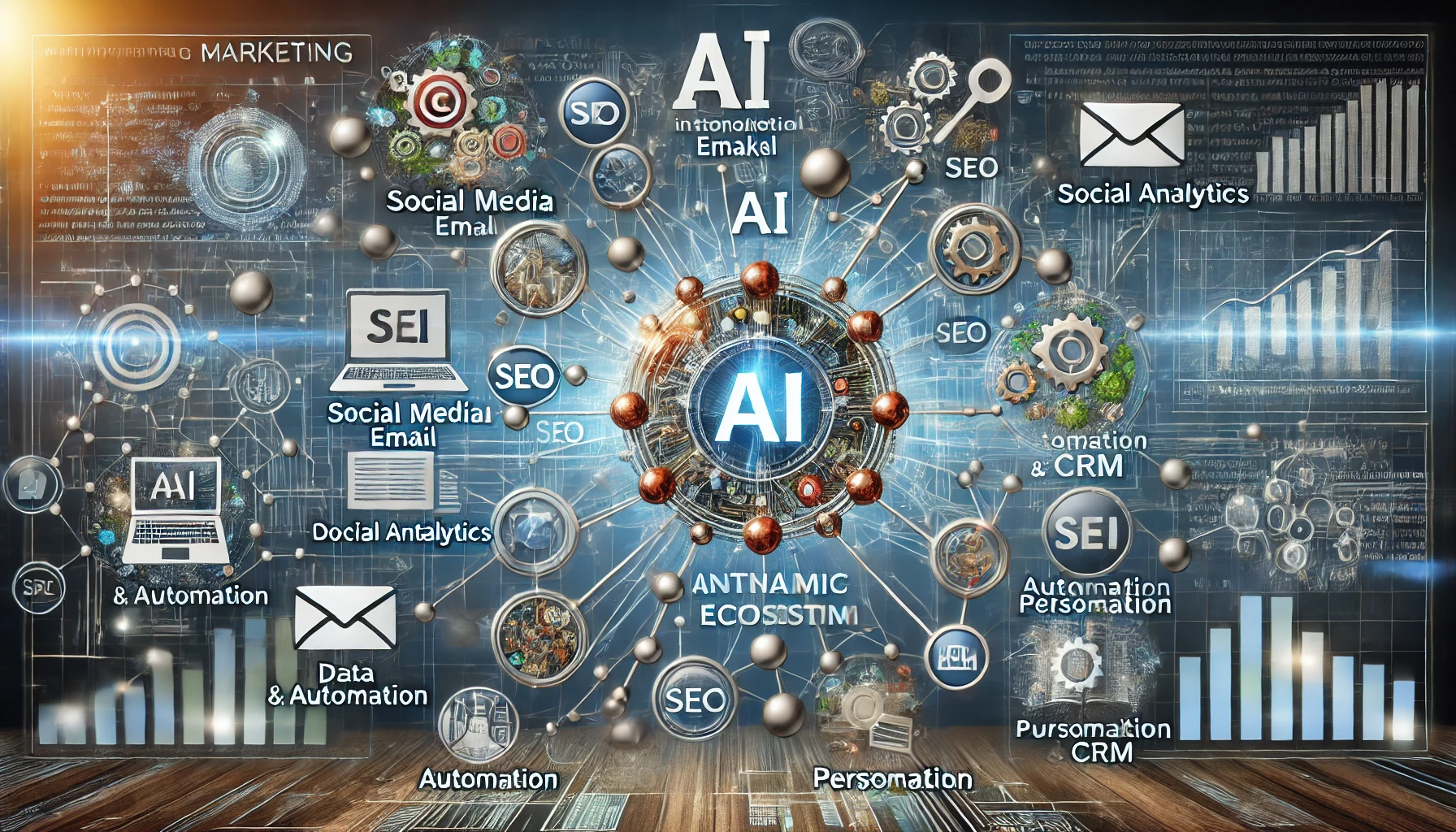Creating a cohesive and effective marketing strategy is crucial for business growth and sustainability. The concept of a marketing ecosystem encompasses a holistic approach to marketing, integrating various channels and strategies to ensure consistent messaging, brand recognition, and customer engagement. With the advent of artificial intelligence (AI), businesses now have the opportunity to enhance traditional marketing methods, making their strategies more efficient, personalized, and impactful.
This article delves into the concept of a marketing ecosystem, the role of AI in creating and managing this ecosystem, and how combining AI with traditional strategies can lead to better audience research, segmentation, and overall marketing success. By exploring hypothetical case studies within the home remodeling industry, we will illustrate how these integrations can be practically applied to drive business growth.
Key Takeaways
- Understanding the Marketing Ecosystem:
- A marketing ecosystem integrates various marketing channels and strategies into a unified system, including inbound and outbound marketing, customer engagement, and data analytics.
- An integrated approach ensures consistent messaging and branding across all platforms, maximizing marketing efficiency and enhancing customer experience.
- Role of AI in Marketing:
- AI technologies like machine learning, natural language processing, and predictive analytics revolutionize marketing by enabling data-driven decisions.
- AI tools collect and analyze vast amounts of data, providing deeper insights into customer behavior and preferences, and enhancing CRM systems through automation and personalization.
- Combining Inbound Marketing with AI-Driven Content Personalization:
- AI assists in creating personalized content tailored to individual preferences, increasing engagement and customer loyalty.
- Implementing AI-driven personalization strategies such as dynamic website content, email personalization, and product recommendations can significantly improve marketing outcomes.
- Using AI for Audience Research and Segmentation:
- AI-driven methods like social media listening tools, predictive analytics, and behavioral tracking provide accurate and real-time insights into customer behavior.
- AI enhances market segmentation by analyzing large datasets to identify patterns and create dynamic customer segments, benefiting businesses by identifying high-value customers and tailoring marketing messages accordingly.
- Practical Applications and Case Studies:
- Hypothetical case studies of small, medium, and large home remodeling companies illustrate how integrating AI with traditional marketing strategies can lead to increased brand awareness, customer engagement, and long-term growth.
- Best Practices for Integrating AI with Traditional Marketing:
- Develop a balanced approach that leverages both AI and traditional marketing strengths, ensuring human oversight to maintain creativity and emotional connection.
- Stay updated with AI advancements and encourage continuous learning within the marketing team to adapt to new technologies effectively.
- Address ethical considerations in AI marketing to maintain customer trust, focusing on transparency, data privacy, and responsible AI use.
- Future Trends and Preparation:
- Emerging trends in AI and traditional marketing integration include increased automation, enhanced personalization, and more sophisticated data analytics.
- Preparing for these advancements will help businesses stay competitive and build a more effective marketing ecosystem.
By following these key takeaways, businesses can build a robust marketing ecosystem that effectively integrates AI with traditional strategies, driving growth and success in the competitive market.
Understanding the Marketing Ecosystem
Definition and Components
A marketing ecosystem is a comprehensive framework that integrates various marketing channels and strategies into a unified system. This ecosystem includes inbound marketing, outbound marketing, customer engagement, and data analytics, all working together to create a seamless and effective marketing strategy.
Key Components:
- Inbound Marketing: Focuses on attracting customers through content creation,SEO, social media, and other forms of content marketing.
- Outbound Marketing: Traditional methods such as advertising, direct mail, and public relations.
- Customer Engagement: Strategies to interact with customers and build lasting relationships.
- Data Analytics: Collecting and analyzing data to inform and optimize marketing strategies.
Importance of an Integrated Approach
An integrated marketing approach ensures that all components work together harmoniously, providing consistent messaging and branding across all platforms. This holistic strategy maximizes the efficiency of marketing efforts, improves customer experience, and enhances brand loyalty.
Challenges in Creating a Marketing Ecosystem
Creating a marketing ecosystem comes with its challenges, including:
- Resource Allocation: Balancing budgets and resources across various channels.
- Data Integration: Ensuring data from different sources is harmonized and actionable.
- Consistency: Maintaining consistent messaging and branding across all channels.
- Technology Integration: Combining traditional and modern technologies seamlessly.
Solutions:
- Strategic Planning: Develop a comprehensive plan that outlines resource allocation and integration strategies.
- Unified Platforms: Use integrated marketing platforms that consolidate data from various sources.
- Brand Guidelines: Establish clear brand guidelines to ensure consistency.
- Technology Training: Provide training for staff to effectively use and integrate new technologies.
Role of AI in Creating and Managing a Marketing Ecosystem
Introduction to AI in Marketing
AI has revolutionized the marketing landscape by introducing technologies such as machine learning, natural language processing, and predictive analytics. These technologies enable marketers to analyze large datasets, gain insights, and make data-driven decisions.
AI-Driven Data Collection and Analysis
AI tools can collect and analyze vast amounts of data, providing deeper insights into customer behavior and preferences. This data-driven approach allows businesses to tailor their marketing strategies more effectively.
AI in Customer Relationship Management (CRM)
AI enhances CRM systems by automating tasks, predicting customer behavior, and providing personalized customer interactions. AI-driven CRM tools can segment customers, track interactions, and optimize communication strategies.
Automation and Efficiency
AI automates repetitive marketing tasks such as email campaigns, social media postings, and ad placements. This automation increases efficiency, allowing marketers to focus on strategic planning and creative tasks.
Combining Inbound Marketing with AI-Driven Content Personalization
Overview of Inbound Marketing
Inbound marketing attracts customers through content creation, SEO, social media, and email marketing. It focuses on providing valuable content that draws customers in organically.
AI-Driven Content Creation and Curation
AI assists in creating personalized content by analyzing customer data and generating relevant content tailored to individual preferences. Tools like chatbots, recommendation engines, and content generation software can enhance content marketing efforts.
Personalization Strategies
Personalized marketing is crucial for engaging customers and building loyalty. AI enables businesses to deliver personalized experiences by analyzing customer data and predicting needs.
Methods to Implement AI-Driven Personalization:
- Dynamic Content: Tailoring website content to individual users.
- Email Personalization: Customizing email content based on user behavior and preferences.
- Product Recommendations: Using AI to suggest products based on past purchases and browsing history.
Case Study: AI-Driven Inbound Marketing for Home Remodeling
Scenario: A home remodeling company wants to increase its customer base and engagement through personalized marketing.
Implementation:
- AI Tools: Use AI-driven tools to analyze customer data and segment the audience.
- Personalized Content: Create personalized content for different segments, such as blog posts, social media updates, and email newsletters.
- Results: Increased engagement, higher conversion rates, and improved customer satisfaction.
Using AI for Audience Research and Segmentation
Importance of Audience Research
Understanding the audience is critical for creating effective marketing strategies. Audience research helps businesses identify customer needs, preferences, and behaviors.
Traditional vs. AI-Driven Audience Research Methods
Traditional Methods:
- Surveys and questionnaires
- Focus groups
- Market analysis
AI-Driven Methods:
- Social media listening tools
- Predictive analytics
- Behavioral tracking
AI Tools for Audience Research
AI tools provide accurate and real-time insights into customer behavior. These tools can analyze social media interactions, browsing history, and purchase patterns to create detailed customer profiles.
Segmentation Techniques
Market segmentation involves dividing a broad market into smaller segments with similar characteristics. AI enhances segmentation by analyzing vast amounts of data and identifying patterns.
AI Techniques for Effective Segmentation:
- Clustering Algorithms: Grouping customers based on similar behaviors and characteristics.
- Predictive Modeling: Predicting future behaviors and needs of different segments.
- Behavioral Analysis: Analyzing customer interactions to create dynamic segments.
Practical Applications in the Home Remodeling Industry
AI-driven segmentation can benefit home remodeling companies by identifying high-value customers, predicting renovation needs, and tailoring marketing messages.
Example: A remodeling company uses AI to identify customers likely to need kitchen renovations. The company then targets these customers with personalized offers and content, resulting in higher conversion rates.
Hypothetical Case Studies of Integrated AI and Traditional Marketing Strategies
Case Study 1: A Small Home Remodeling Company
Scenario: A small company with a limited marketing budget wants to increase its reach and customer base.
Strategy:
- AI Integration: Use AI tools for audience research and personalized content creation.
- Traditional Methods: Combine with local advertising and community engagement.
- Results: Increased brand awareness and customer engagement with minimal budget increase.
Case Study 2: A Medium-Sized Home Remodeling Firm
Scenario: A mid-sized company looking to scale operations and increase market share.
Strategy:
- AI Insights: Utilize AI for detailed audience segmentation and predictive analytics.
- Traditional Campaigns: Run targeted advertising and direct mail campaigns.
- Results: Enhanced campaign effectiveness, better resource allocation, and higher ROI.
Case Study 3: A Large Home Remodeling Enterprise
Scenario: A large enterprise aiming for market dominance and improved customer loyalty.
Strategy:
- Advanced AI Applications: Implement AI-driven CRM and automated marketing workflows.
- Brand Building: Invest in brand-building through traditional media and sponsorships.
- Results: Stronger brand presence, increased customer loyalty, and long-term growth.
Best Practices for Integrating AI with Traditional Marketing Strategies
Developing a Balanced Approach
Balancing AI and traditional marketing ensures a comprehensive strategy that leverages the strengths of both. Human oversight in AI-driven processes is crucial to maintain creativity and emotional connection.
Continuous Learning and Adaptation
Staying updated with AI advancements and encouraging continuous learning within the marketing team is essential. This ensures that the team can adapt to new technologies and leverage them effectively.
Ethical Considerations
Addressing ethical concerns in AI marketing is crucial for maintaining customer trust. Best practices include transparency, data privacy, and responsible AI use.
Future Trends
Emerging trends in AI and traditional marketing integration include increased automation, enhanced personalization, and more sophisticated data analytics. Preparing for these advancements will help businesses stay competitive.
Conclusion
Integrating AI with traditional marketing strategies is essential for building an effective marketing ecosystem. By leveraging AI for data collection, audience research, and personalized content, businesses can enhance their marketing efforts and achieve better results. The hypothetical case studies demonstrate how these integrations can be applied in the home remodeling industry to drive growth and success.
For businesses looking to stay ahead in the competitive market, adopting a comprehensive marketing ecosystem that combines AI with traditional strategies is not just an option but a necessity.
If you’re ready to take your marketing strategy to the next level, consider scheduling a strategy session with our experts. During this session, we’ll analyze your current marketing efforts, identify opportunities for AI integration, and create a tailored plan to help you achieve your business goals. Contact us today to schedule your free strategy session and start building a more effective marketing ecosystem.
Frequently Asked Questions (FAQs)
What is a marketing ecosystem?
A marketing ecosystem is a comprehensive framework that integrates various marketing channels and strategies into a unified system. This ecosystem includes inbound marketing, outbound marketing, customer engagement, and data analytics, all working together to create a seamless and effective marketing strategy.
How does AI enhance traditional marketing strategies?
AI enhances traditional marketing strategies by leveraging technologies such as machine learning, natural language processing, and predictive analytics. These technologies enable marketers to analyze large datasets, gain deeper insights into customer behavior, automate repetitive tasks, and create personalized content, thereby increasing marketing efficiency and effectiveness.
What are the benefits of integrating AI with traditional marketing strategies?
Integrating AI with traditional marketing strategies offers several benefits, including:
Higher engagement and conversion rates
Enhanced data collection and analysis
Improved customer segmentation and targeting
Increased efficiency through automation
More personalized and relevant content
Better customer relationship management (CRM)
How can AI be used for audience research and segmentation?
AI can be used for audience research and segmentation by analyzing vast amounts of data from various sources, such as social media interactions, browsing history, and purchase patterns. AI tools can provide accurate and real-time insights into customer behavior, identify patterns, and create dynamic segments based on similar characteristics, enabling more targeted and effective marketing strategies.
What are some examples of AI-driven personalization strategies?
Some examples of AI-driven personalization strategies include:
Product recommendations using AI to suggest products based on past purchases and browsing history
Dynamic website content tailored to individual users
Email personalization based on user behavior and preferences
Can small businesses benefit from integrating AI with their marketing strategies?
Yes, small businesses can significantly benefit from integrating AI with their marketing strategies. AI tools can help small businesses with limited budgets to conduct audience research, create personalized content, and automate marketing tasks, leading to increased brand awareness, customer engagement, and overall marketing effectiveness.
What are some common challenges in creating a marketing ecosystem?
Common challenges in creating a marketing ecosystem include:
Combining traditional and modern technologies seamlessly
Balancing budgets and resources across various channels
Ensuring data from different sources is harmonized and actionable
Maintaining consistent messaging and branding across all channels
How can businesses overcome the challenges of creating a marketing ecosystem?
Businesses can overcome the challenges of creating a marketing ecosystem by:
Providing training for staff to effectively use and integrate new technologies
Developing a comprehensive plan that outlines resource allocation and integration strategies
Using integrated marketing platforms that consolidate data from various sources
Establishing clear brand guidelines to ensure consistency
What ethical considerations should be addressed when using AI in marketing?
When using AI in marketing, it is crucial to address ethical considerations such as:
Maintaining customer trust through ethical AI practices
Ensuring transparency in AI processes
Protecting customer data privacy
Using AI responsibly to avoid biases and discrimination
How can businesses stay updated with AI advancements in marketing?
Businesses can stay updated with AI advancements in marketing by:
Participating in online courses and training programs focused on AI and digital marketing
Encouraging continuous learning and professional development within the marketing team
Attending industry conferences, webinars, and workshops
Subscribing to industry publications and following thought leaders in AI and marketing
What future trends should businesses prepare for in AI and marketing integration?
Emerging trends in AI and marketing integration include increased automation, enhanced personalization, and more sophisticated data analytics. Businesses should prepare for these advancements by staying informed, investing in the latest technologies, and continuously adapting their marketing strategies to leverage new AI capabilities effectively.
How can I schedule a strategy session to integrate AI with my marketing strategies?
To schedule a strategy session, contact our team through our website or call our office directly. During the session, our experts will analyze your current marketing efforts, identify opportunities for AI integration, and create a tailored plan to help you achieve your business goals. Take the first step towards building a more effective marketing ecosystem by scheduling your free strategy session today.
This article is a collaboration between Carl Willis and OpenAI’s ChatGPT. Created on July 23, 2024, it combines AI-generated draft material with Willis’s expert revision and oversight, ensuring accuracy and relevance while addressing any AI limitations.






